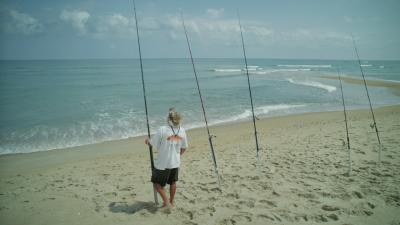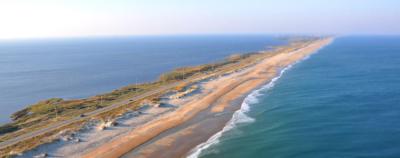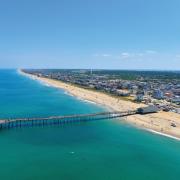Read on to learn about one of the greatest threats to our beaches, oceans and marine life and how you can help protect them.
Imagine this: You’re walking along the beach of Cape Hatteras National Seashore when something catches your eye up ahead. It’s small, bright blue and partially hidden in the sand.
Sea glass? You wonder as you peer down at the object.
Upon further inspection, you come away disappointed: it’s a plastic bottle cap.
Unfortunately, you don’t have to think too hard to imagine this scenario because it has probably happened to you.
It can be tempting to dismiss a plastic bottle cap as insignificant. But the reality is, “more than 90% of the trash floating in the ocean and littering our shores is plastic,” according to the National Park Service. All of those plastic bottle caps—as well as numerous other plastic products—add up to create a huge problem. According to the North Carolina Coastal Federation, the most common types of marine debris in the state are: “consumer debris, abandoned and derelict fishing gear, abandoned and derelict vessels, and storm debris.”
Plastic and other nonbiodegradable debris are one of the greatest threats to our oceans and to our seashores, like Cape Hatteras National Seashore. The National Park Service states: “Plastic poses a serious threat to our oceans and waterways. Birds, turtles, fish, and other marine life ingest the plastic pieces, mistaking them for fish eggs, plankton, jellyfish, or other food sources. Every year, hundreds of thousands of sea creatures, both large and small, die from complications relating to plastic debris – they may have a stomach full of plastic that they cannot digest, or they may become fatally entangled in debris.”

Generally, there are two main types of plastics that pollute beaches and oceans:
- Consumer plastics (larger plastic goods like disposable cups and straws)
- Microplastics (tiny plastic particles that never decay) or microbeads (which come from bath products).
According to our friend, Nicole Loiseau, Acting District Interpreter for Cape Hatteras National Seashore and the Volunteer and Youth Program Manager for your OBX national parks, the following kinds of pollution are often seen on our local beaches:
- Micro-trash/smalls bits of plastic
- Plastic water bottles
- Plastic utensils
- Cigarette butts
- Water bottle caps
- Wooden debris from houses
Sea turtles are especially susceptible to the hazards of plastic and other consumer debris. Discarded monofilament line—commonly known as fishing line—can become wrapped around sea turtles, rendering them unable to swim or eat. According to Cape Lookout Studies’ North Carolina Monofilament Recovery and Recycling Program, monofilament line is made of a strong plastic that is nearly indestructible: it would take an estimated 600 years for it to decay! Additionally, the U.S. Fish and Wildlife Service notes that sea turtles often think plastic items (like grocery bags, Styrofoam pieces and balloons) are food and eat them, which can result in intestinal blockage and death.

So, what can you do about plastic pollution? Take these steps when you visit your OBX beaches:
- Pack it in, pack it out: take all of your trash with you when you leave the beach.
- Bag it! Bring an extra bag to the beach and remove trash and plastic when you see it.
- Sign up to volunteer: We’ll notify you of Beach Cleanup Days and other opportunities to help your parks.
- Plan a family or group beach cleanup: Contact Nicole for more information. (Within current COVID-19 guidelines)
- Avoid single-use plastics whenever possible: If you do choose to use them, think about how you can reuse them or recycle them.
- Discard fishing line in appropriate recycling receptacles: Your parks partnered with the North Carolina Monofilament Recovery and Recycling Program in 2014 to install three of these receptacles on the seashore at Ramp 44 in Buxton, Ramp 55 in Hatteras and the Frisco Bath House. You can also recycle fishing line at these local businesses:
- TW’s Bait and Tackle: Corolla, Kitty Hawk, Nags Head
- Outer Banks Fishing Pier: Nags Head
- Oregon Inlet Fishing Center: Nags Head
- Tradewinds Tackle Shop: Ocracoke
- National Park Service Boat Ramp: Ocracoke
You can also track ocean pollution in real time. NOAA has developed an online marine debris tracker app in conjunction with the University of Georgia’s College of Engineering. The app tracks and reports both the type of debris and their location around the world.

